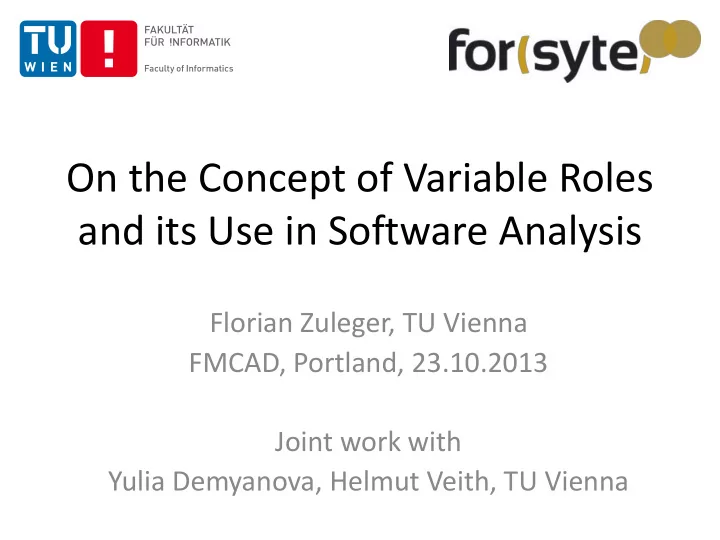

On the Concept of Variable Roles and its Use in Software Analysis Florian Zuleger, TU Vienna FMCAD, Portland, 23.10.2013 Joint work with Yulia Demyanova, Helmut Veith, TU Vienna
Variable Roles Intuitively, variable roles are patterns of how variables are used by programmers Ex. 1 Ex. 2 Ex. 3 int i = 0; int x = 2 * y ; int x = y << 1; while ( i < n) { x , y are linear x , y are bitvectors a[ i ] = 0; variables i ++; } Ex. 5 Ex. 4 int i = open(path, flags); int i = getchar(); i is a loop iterator i is an array index i is a file descriptor i is a character Florian Zuleger 2
Outline 1. Choice and Formalisation 2. Experimental Validation 3. Discussion: Uses of Variable Roles Florian Zuleger 3
Variable Role Informal Definition SYNT CONST not assigned any value in the program CONST ASSIGN assigned only numeric literals or CONST ASSIGN variables COUNTER only incremented/decremented or assigned zero LINEAR assigned only linear combinations of LINEAR variables BOOL assigned only zero, one, BOOL variables or boolean expressions INPUT variable is passed to a function by reference at least one BRANCH COND occurs in the condition of if statement at least once BITVECTOR occurs in a bitwise operation or assigned the result of a bitwise operation at least once UNRESOLVED assigned the value of a pointer dereference CHAR assigned only character literals, CHAR variables or initialised in a specific library function (e.g. getchar) LOOP ITERATOR occurs in the condition of the loop iterator and must be assigned in the loop body Florian Zuleger 4
Choice and Formalisation • Roles were chosen studying 5.2 KLOC code from Cbench benchmark (standard C programs): – Goal: find the smallest set of roles to classify every occurring variable – Restriction to the types int, float, and char • Standard dataflow analysis serves as 1) definition and 2) algorithm to compute variable roles. Florian Zuleger 5
Role Definition: Example LINEAR: greatest fixed point int n =0; int y = x ; Iterations: while( x ){ 0:{ x , y , n } 1:{ y , n } 2:{ n } n = n +1; x = x &( x -1); } BITVECTOR: one pass “all variables in bitvector operations”: { x } Florian Zuleger 6
Implementation • Prototype built on top of clang • Flow-insensitive analysis (analysis requires only the AST) • Trade-of between cost and precision: – Interprocedural analysis – No pointer analysis implemented • Systematic study of (syntactic) usage patterns of variables Florian Zuleger 7
Outline 1. Choice and Formalisation 2. Experimental Validation 3. Discussion: Uses of Variable Roles Florian Zuleger 8
Experiment How to validate that our definition of variable roles is useful? Opportunity: • SVCOMP (Competition on Software Verification) contains files in different categories • Files classified by human expert Experiment: Can the relative frequencies of the variable roles replace the human expert in the classification of the files into competition categories? Florian Zuleger 9
SVCOMP'13 benchmark 90 80 70 60 50 boolean flag 40 branch condition counter 30 input 20 bitvector unresolved assignment 10 array index loop iterator 0 Florian Zuleger 10 loop iterator array index unresolved assignment bitvector input counter branch condition boolean flag
Experiment: Results • Multiclass vector support machine • Output: probability of membership in category • Random selection of training set Training set Correct classification (in %) (% of all files) 1. probability 1.+2. probability 90 84.06 97.10 80 85.19 94.07 70 83.80 92.02 60 80.23 92.02 50 81.40 91.46 Florian Zuleger 11
Outline 1. Choice and Formalisation 2. Experimental Validation 3. Discussion: Uses of Variable Roles Florian Zuleger 12
Variable Roles in Program Analysis Reviewer: „ How can variable roles help to avoid plane crashes ?“ Many program analysis tools treat a program as a formula and program analysis as constraint solving → tools work the same for obfuscated code?? Our vision: variable roles enable a systematic study of heuristics in program anlaysis and help to understand the strength of program analysis tools Florian Zuleger 13
Envisioned Uses of Variable Roles • Program analysis tools: selection of predicates or abstract domains guided by variable roles (e.g. in ASTREÉ) • Quantitative characteristics on software verification benchmarks → Explaining the results • Building a portfolio-solver Florian Zuleger 14
Conclusion Variable Roles have predictive power. Work in progress, your feedback is very welcome! Future Work: • Extract roles from variable names / comments • Explore connection to types Florian Zuleger 15
Recommend
More recommend